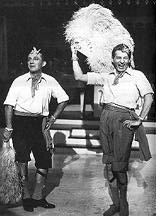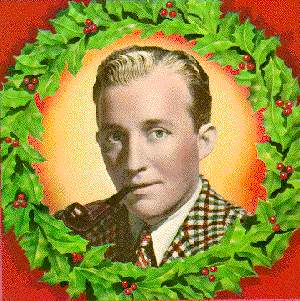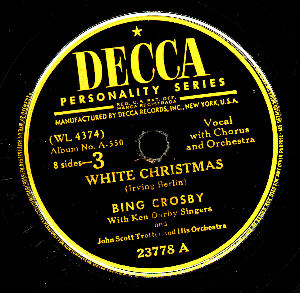White Christmas was written by a Jew, Irving Berlin, for a 1942 movie "Holiday Inn" starring Bing Crosby and Fred Astaire. Berlin's assignment was to write a song about each of the major holidays of the year. He found that writing a song about Christmas was the most challenging. When Bing first heard Berlin audition "White Christmas" in 1941 he reassured Irving that he had created a winner. Bing's preliminary evaluation turned out to be a gross understatement.
Bing introduced "White Christmas" to the public on his NBC radio show, the Kraft Music Hall, December 25, 1941. Apparently, no complete transcription of this broadcast survived the War, although one low-quality aircheck (recorded from a radio) has survived of Bing singing "White Christmas." Bing recorded the song for Decca on May 29, 1942, with the John Scott Trotter Orchestra. "Holiday Inn" was released in August.
"White Christmas," a song of peace and yearning for "the ones we used to know," was released to a war-torn public during the darkest days of World War II. By the end of the War it had become the biggest-selling single of all time. Bing's recording hit the charts on Oct. 3, 1942, and rose to #1 on Oct. 31, where it stayed for an amazing 11 weeks. In the following years Bing's recording hit the top-30 pop charts another 16 times, even topping the charts again in 1945 and January of '47. The song remains Bing's best-selling recording, and the best-selling Christmas single of all-time.
 Whenever Bing sang for the troops during the War, he was usually asked to sing "White
Christmas," which would often bring tears to the eyes of many of the soldiers. Clearly the song
had had an effect not anticipated by Berlin or Crosby as a result of the War. Following Crosby's tour of Europe in the fall of 1944 to entertain the troops, he reported on the remarkable effects of this song.
Whenever Bing sang for the troops during the War, he was usually asked to sing "White
Christmas," which would often bring tears to the eyes of many of the soldiers. Clearly the song
had had an effect not anticipated by Berlin or Crosby as a result of the War. Following Crosby's tour of Europe in the fall of 1944 to entertain the troops, he reported on the remarkable effects of this song.
 Click on the icon to download Bing talking about and singing White Christmas, from his Oct. 12, 1944, Kraft Music Hall. (MP3 audio format, 2:06 minutes)
Click on the icon to download Bing talking about and singing White Christmas, from his Oct. 12, 1944, Kraft Music Hall. (MP3 audio format, 2:06 minutes)
The success of the song led eventually to a movie based on the song. The movie White Christmas was released in 1954 and became the leading box-office draw of 1954. The movie was originally cast to reunite Crosby and Astaire for their third Irving Berlin extravaganza of song and dance. However, Astaire bowed out after reading the script, suggesting he felt he was too old for the part. Donald O'Connor was selected to replace Astaire, but he, too, had to exit because of an illness he may have acquired from Francis, the talking mule. O'Connor was replaced by Danny Kaye, who was rewarded with one of the most generous movie contracts of his career.
 According to the 2015 Guinness Book of Records, Bing's single of "White Christmas" has sold more than 50 million copies worldwide and is the best-selling single in any music category in history (page 166). In addition, Bing's recording of "White Christmas" has sold additional millions of copies as part of numerous albums, including his best-selling album Merry Christmas, which was first released as an LP in 1949.
According to the 2015 Guinness Book of Records, Bing's single of "White Christmas" has sold more than 50 million copies worldwide and is the best-selling single in any music category in history (page 166). In addition, Bing's recording of "White Christmas" has sold additional millions of copies as part of numerous albums, including his best-selling album Merry Christmas, which was first released as an LP in 1949.
The most familiar version of "White Christmas" is not the one Crosby recorded in 1942, however. Bing was called back to the Decca studios on March 19, 1947, to re-record "White Christmas" as a result of damage to the 1942 master due to its frequent use. Every effort was made to reproduce the original Decca recording session, once again including the John Scott Trotter Orchestra and the Ken Darby Singers. The resulting re-issue is the one that has become most familiar to the public. However, the 1998 MCA double-CD "Bing Crosby -- The Voice of Christmas," includes the original 1942 release as well as three other versions by Bing.
Bing's "White Christmas" had the distinction of marking the end of the Vietnam War in 1975. As the North Vietnamese surrounded Saigon an evacuation plan was set into motion to bring the remaining Americans and some South Vietnamese to safety. The cue to evacuate would be a radio announcement that the temperature in Saigon was "105 degrees and rising," which would be followed by Bing's "White Christmas." When the moment of truth arrived Bing's voice triggered a mad scramble for the U.S. embassy, where helicopters were waiting. Ironically, the first rock'n'roll war ended on a pre-rock note. And Bing, who had quietly opposed American involvement in Vietnam, contributed to the American exit.
 Whenever Bing sang for the troops during the War, he was usually asked to sing "White
Christmas," which would often bring tears to the eyes of many of the soldiers. Clearly the song
had had an effect not anticipated by Berlin or Crosby as a result of the War. Following Crosby's tour of Europe in the fall of 1944 to entertain the troops, he reported on the remarkable effects of this song.
Whenever Bing sang for the troops during the War, he was usually asked to sing "White
Christmas," which would often bring tears to the eyes of many of the soldiers. Clearly the song
had had an effect not anticipated by Berlin or Crosby as a result of the War. Following Crosby's tour of Europe in the fall of 1944 to entertain the troops, he reported on the remarkable effects of this song.
 White Christmas was written by a Jew, Irving Berlin, for a 1942 movie "Holiday Inn" starring Bing Crosby and Fred Astaire. Berlin's assignment was to write a song about each of the major holidays of the year. He found that writing a song about Christmas was the most challenging. When Bing first heard Berlin audition "White Christmas" in 1941 he reassured Irving that he had created a winner. Bing's preliminary evaluation turned out to be a gross understatement.
White Christmas was written by a Jew, Irving Berlin, for a 1942 movie "Holiday Inn" starring Bing Crosby and Fred Astaire. Berlin's assignment was to write a song about each of the major holidays of the year. He found that writing a song about Christmas was the most challenging. When Bing first heard Berlin audition "White Christmas" in 1941 he reassured Irving that he had created a winner. Bing's preliminary evaluation turned out to be a gross understatement.
 According to the 2015 Guinness Book of Records, Bing's single of "White Christmas" has sold more than 50 million copies worldwide and is the best-selling single in any music category in history (page 166). In addition, Bing's recording of "White Christmas" has sold additional millions of copies as part of numerous albums, including his best-selling album
According to the 2015 Guinness Book of Records, Bing's single of "White Christmas" has sold more than 50 million copies worldwide and is the best-selling single in any music category in history (page 166). In addition, Bing's recording of "White Christmas" has sold additional millions of copies as part of numerous albums, including his best-selling album